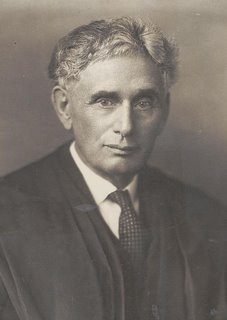
It's remarkable how thoroughly political dustups are forgotten, even if aspects of them later repeat themselves in some way. Intense arguments over Supreme Court nominees, though common in recent decades, are nothing new. The nomination of Louis Dembitz Brandeis to the high court by President Wilson on this day 91 years ago touched off a lengthy controversy.
"Prior to the nomination, [Wilson] only conferred privately with Senator Robert M. LaFollette, the leader of the Progressive Party," writes Richard C. Kagan, professor of history at Hamline University in St. Paul, on his web site. "The suddenness of the announcement, and the secrecy of the decision to appoint a Jew caused a political sensation. For over four months, the longest in the history of a Supreme Court nominee, the Senate Judiciary committee heard heated and complicated testimony...
"The anti-Semitism evident at Brandeis' Senate hearings was subtle. Neither the Boston Brahmins nor the Wall Street lawyers would openly admit their motives... Brandeis was an outsider who denied the legitimacy of the legal system that supported unfettered capitalism. Since Brandeis' intellect, knowledge of the law, and judicial accomplishments were unimpeachable, the Senate Hearings focused on the nature of his 'character.'
"The attack on Brandeis' nomination was led by the State Street and Wall Street legal elite: Henry Cabot Lodge, Senator from Massachusetts, and A. Lawrence Lowell, a corporate lawyer, former President of the American Bar Association and President of Harvard, and William Howard Taft. Lodge questioned Brandeis' fitness to serve: 'For the first time in our history a man has been nominated to the Supreme Court with a view to attracting to the President a group of voters on racial grounds. Converting the United States into a Government by foreign groups is to me the most fatal thing that can happen to our Government . . .' "
In the end, Wilson was a strong enough president to get his way on the Brandeis nomination, persuading most members of his own party to go along with it. Brandeis subsequently served as a distinguished member of the Supreme Court until 1939.
1 comment:
You'll recall that in 1853 Judah Benjamin, later "the brains of the Confederacy," turned down Millard Fillmore's offer to nominate him to the Supreme Court, thereby missing his chance to be that body's first Jewish Justice. ANK
Post a Comment